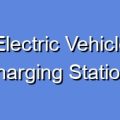The Electric Revolution: Tesla vs NIO

The electric revolution is gaining momentum as Tesla and NIO emerge as key players in the industry. With their innovative electric vehicles, both companies are reshaping the automotive landscape and pushing the boundaries of sustainable transportation.
The electric revolution is in full swing, with companies like Tesla and Nio leading the charge. As the world shifts towards a more sustainable future, these two automotive giants are at the forefront of innovation. With their cutting-edge technology and commitment to electric vehicles, Tesla and Nio are revolutionizing the way we think about transportation. Tesla, founded by Elon Musk, has become synonymous with electric cars, offering sleek designs and impressive performance. Nio, on the other hand, is a Chinese electric vehicle manufacturer that is gaining traction in the global market. Both companies are focused on pushing the boundaries of what is possible with electric vehicles, offering longer ranges, faster charging times, and advanced autonomous driving capabilities. The competition between Tesla and Nio is driving the industry forward and inspiring other automakers to join the electric revolution.
| Electric revolution: Tesla and Nio are leading the way in the automotive industry. |
| Tesla’s electric vehicles have gained widespread popularity and recognition. |
| Nio, a Chinese automaker, is emerging as a strong competitor in the electric car market. |
| Tesla’s innovative technology and sleek design have revolutionized the electric vehicle industry. |
| Nio’s focus on performance and cutting-edge features has attracted a loyal customer base. |
- Tesla’s autonomous driving capabilities have set new standards in the industry.
- Nio’s advanced battery technology allows for longer driving range and faster charging.
- The rivalry between Tesla and Nio is driving rapid advancements in the electric car sector.
- Tesla’s Supercharger network provides convenient and efficient charging infrastructure.
- Nio’s innovative battery swapping stations offer a unique solution for quick battery replacement.
What is the significance of the electric revolution in the automotive industry?
The electric revolution in the automotive industry has brought about significant changes and advancements. Electric vehicles (EVs) are becoming increasingly popular due to their environmental benefits, reduced dependence on fossil fuels, and improved energy efficiency. This revolution is transforming the way we think about transportation and paving the way for a more sustainable future.
| Reduction of Carbon Emissions | Improved Energy Efficiency | Reduced Dependence on Fossil Fuels |
| Electric vehicles produce zero tailpipe emissions, helping to combat climate change and reduce air pollution. | Electric motors are more energy efficient compared to internal combustion engines, leading to better fuel economy and lower energy consumption. | Electric vehicles rely on electricity as their primary source of energy, reducing the need for fossil fuels and promoting renewable energy adoption. |
| Promotion of Sustainable Transportation | Enhanced Performance and Acceleration | Lower Maintenance Costs |
| Electric vehicles contribute to the development of sustainable transportation systems, reducing the environmental impact of transportation. | Electric motors provide instant torque, resulting in faster acceleration and improved performance compared to traditional vehicles. | Electric vehicles have fewer moving parts and require less maintenance, leading to lower maintenance costs for owners. |
How does Tesla contribute to the electric revolution?
Tesla is one of the key players in the electric revolution. They have been at the forefront of developing and manufacturing electric vehicles that offer impressive performance, long-range capabilities, and innovative features. Tesla’s commitment to advancing battery technology and building a global charging infrastructure has played a significant role in accelerating the adoption of EVs worldwide.
– Tesla has revolutionized the electric vehicle industry by introducing high-performance electric cars that have a longer range compared to other electric vehicles. These cars have become popular among consumers, leading to a shift in the automotive market towards electric vehicles.
– The company has invested heavily in building a network of Supercharger stations, which are fast-charging stations for Tesla vehicles. This infrastructure has helped alleviate one of the main concerns of electric vehicle owners, which is the limited availability of charging stations. Tesla’s Supercharger network has made long-distance travel more feasible for electric vehicle owners.
– Tesla has also made significant advancements in battery technology. The company manufactures its own batteries, which are known for their high energy density and long lifespan. These batteries not only power Tesla vehicles but are also used in energy storage systems, allowing for the integration of renewable energy sources into the electric grid. By improving battery technology, Tesla has helped accelerate the adoption of electric vehicles and renewable energy.
What is NIO’s role in the electric revolution?
NIO is another prominent player in the electric revolution, particularly in China. They are known for their high-performance electric vehicles and innovative battery swap technology, which allows for faster and more convenient recharging. NIO’s focus on providing a seamless user experience and their efforts in autonomous driving technologies contribute to the ongoing transformation of the automotive industry.
- NIO is a leading Chinese electric vehicle manufacturer that plays a crucial role in the electric revolution.
- One of NIO’s main contributions to the electric revolution is its focus on developing advanced battery technology.
- NIO’s electric vehicles, such as the NIO ES8 and NIO ES6, offer long-range capabilities and fast charging options, making them more convenient and reliable for consumers.
- Another significant role of NIO in the electric revolution is its emphasis on creating a sustainable charging infrastructure. NIO has built a network of power swap stations, enabling drivers to quickly exchange their depleted batteries for fully charged ones.
- Moreover, NIO is actively involved in promoting clean energy and reducing carbon emissions. The company has implemented various initiatives, such as planting trees and supporting renewable energy projects, to contribute to a greener future.
How do electric vehicles impact the environment?
Electric vehicles have a positive impact on the environment compared to traditional gasoline-powered cars. By eliminating tailpipe emissions, EVs help reduce air pollution and greenhouse gas emissions, contributing to cleaner air and mitigating climate change. Additionally, as renewable energy sources become more prevalent, charging EVs with clean energy further enhances their environmental benefits.
| Reduced greenhouse gas emissions | Decreased air pollution | Conservation of natural resources |
| Electric vehicles produce zero tailpipe emissions, reducing greenhouse gas emissions and mitigating climate change. | EVs do not emit pollutants such as nitrogen oxide and particulate matter, resulting in improved air quality and human health. | EVs require less natural resources for fuel production compared to conventional vehicles, contributing to resource conservation. |
| Less dependence on fossil fuels | Noise pollution reduction | Energy efficiency |
| EVs rely on electricity, which can be generated from renewable energy sources, reducing dependence on fossil fuels and promoting sustainability. | Electric motors are quieter than internal combustion engines, leading to a decrease in noise pollution in urban areas. | EVs have higher energy efficiency compared to conventional vehicles, as they convert a larger portion of electrical energy into driving force. |
What are the advantages of owning an electric vehicle?
Owning an electric vehicle comes with several advantages. Firstly, EVs offer lower operating costs as electricity is generally cheaper than gasoline. They also require less maintenance due to fewer moving parts and no need for oil changes. Additionally, electric vehicles provide a smooth and quiet driving experience, instant torque, and the convenience of charging at home or at public charging stations.
Owning an electric vehicle offers advantages such as cost savings, environmental benefits, and reduced dependence on fossil fuels.
Are there any challenges associated with the electric revolution?
While the electric revolution brings numerous benefits, there are also challenges that need to be addressed. One of the main challenges is the limited availability of charging infrastructure, especially in certain regions. Range anxiety, which refers to concerns about running out of battery during long trips, is another challenge that needs to be overcome. However, efforts are being made to expand charging networks and improve battery technology to address these challenges.
The electric revolution presents challenges such as infrastructure development, battery technology advancements, and managing the transition from fossil fuels.
What does the future hold for the electric revolution?
The future of the electric revolution looks promising. As technology continues to advance, we can expect further improvements in battery efficiency, range, and charging speeds. The adoption of electric vehicles is projected to increase globally, with governments implementing policies to incentivize their purchase and support the development of charging infrastructure. With ongoing innovation and collaboration among industry players, the electric revolution is set to reshape the automotive industry and accelerate the transition towards sustainable transportation.
1. Increased adoption of electric vehicles
The future of the electric revolution is likely to see a significant increase in the adoption of electric vehicles (EVs). As technology advances and becomes more affordable, more people are expected to make the switch from traditional gasoline-powered cars to EVs. This shift will not only have a positive impact on reducing carbon emissions but also lead to a decrease in reliance on fossil fuels.
2. Advancements in battery technology
One of the key factors driving the electric revolution is the development of advanced battery technology. As battery technology continues to improve, it will address some of the limitations currently associated with electric vehicles, such as limited driving range and long charging times. The future holds the promise of more efficient and affordable batteries, enabling EVs to compete with traditional cars in terms of convenience and performance.
3. Integration of renewable energy sources
The electric revolution is closely tied to the transition towards renewable energy sources. As the demand for electricity increases due to the widespread adoption of EVs, there will be a greater emphasis on generating electricity from renewable sources such as solar and wind power. This integration of renewable energy into the electric grid will not only support the charging infrastructure for EVs but also contribute to a greener and more sustainable energy system.





















